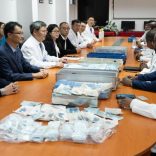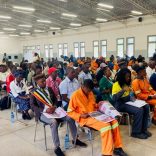Mozambique: Insurgents getting bolder eight years after first attack - João Feijó
Insecurity, hunger and despair in Palma and Quitunda – Media Fax

File photo: RTP
- Thousands continue to seek to leave, but the government turns a deaf ear.
- The vessels that arrived in Paquite last week left Palma without permission.
Outside of the money laundering enjoyed by the party and government machinery, the reports of the direct victims of the conflict still in the town of Palma and the village of Quitunda continue to relate a reality of death, despair, hunger, fear, and repeated requests for evacuation that are rejected by government officials.
In fact, the government is making a gigantic effort to imply that public order and security are restored in the town of Palma, while the reality on the ground shows exactly the opposite.
Proof of the lack of security, mediaFAX knows that, on Friday night, five people were killed and seven houses were burned in one of Palma’s expansion neighbourhoods.
To this are added reports of the deaths on previous days, allegedly at the hands of the Defence and Security Forces (FDS), of people on a list of suspected terrorist collaborators.
With signs of lack of security evident, in addition to people looking for strategies to leave the town, several companies that had responded to the boom in economic activity linked to the area’s LNG projects are also trying to withdraw.
Especially because Total, the main consumer of the services and products they provided, has also temporarily withdrawn.
So what is seen in the town of Palma is the demobilisation of many developments, with a lot of machinery and vehicles being removed from the workshops on the outskirts of the town to Afungi.
At that point in Palma district, businesspeople are trying to load what has been left after the terrorist attack onto ships for removal to Pemba.
Among those leaving is Reef Investments, which has been operating in Cabo Delgado for more than 15 years. During the terrorist assault on the town, Reef is estimated to have lost around US$700,000 of its US$4 million investment.
Drama in Quitunda
Meanwhile, in the village of Quitunda, the scenario is deteriorating with each passing day. Here, people have even forgotten about security issues, and are more concerned with the precarity of daily living conditions.
Reports indicate that there is no water in Quitunda, despite it currently hosting about 20,000 people, meaning that lack of sanitation in crowded conditions opens the way for the outbreak of disease.
“There is no water in the taps. There are a lot of people in the village. At the entrance to the village it smells very bad. People defecate around the village. The market is uncontrollable. There’s garbage, there’s dirty water. The greatest danger is cholera,” one local source narrates, reiterating the familiar request to at least resume the process of evacuating people to Pemba, the current safe haven for many refugees who are crowded in the village of Quitunda.
Of the government, very little is seen. With the National Institute for Disaster Management (INGD), the state support arm for vulnerable populations, showing signs of disconnection, refugees still waiting to leave Quitunda are depending on support from people and institutions of goodwill.
Among this “helping hand” group is Zvika Karadi, owner of Reef Investments. He has rented a house in Quitunda and placed their 11 of his staff to try to help the people in direst need.
With the attack on Palma and the destruction of its infrastructure and machinery, he is said to have decided to leave the country. In other words, he decided not to continue investing in Mozambique.
However, according to Zitamar News, after travelling to Palma and then Quitunda, where he saw the suffering of the people who were gathering there, Karadi decided to help where he could before leaving.
The 11 workers placed in Quitunda receive supplies and medicines that Karadi buys in Pemba and sends to Quitunda for subsequent distribution.
There are indications that he charters small planes to transport people from Afungi to Pemba, and it is up to his employees to select those victims who are in the most critical situation.
Negotiations with Mozambique Airlines (LAM) were said to have been made to ensure that a larger plane could transport the refugees to Pemba, but the process was stopped by the government.
This rejection, it seems, has to do with the governmental thesis that people must return to the town of Palma, even if security conditions are absent. In other words, the government wants above all to establish the idea that the terrorists have been effectively expelled.
Refugees will now have been in Quitunda for 30 days, waiting to be lucky enough to evacuated to safety and able to move on with their lives.
Humanitarian agencies have also been complaining about the fact that the government remains adamant in creating conditions for the importation of supplies and the entry of humanitarian personnel.
Last week, a supply vessel sent by the INGD was unable to unload food for the needy in Palma. The reasons were not clear, but it is suspected that the conclusion was reached that structural and security conditions to deliver the food aid did not exist.












Leave a Reply
Be the First to Comment!
You must be logged in to post a comment.
You must be logged in to post a comment.